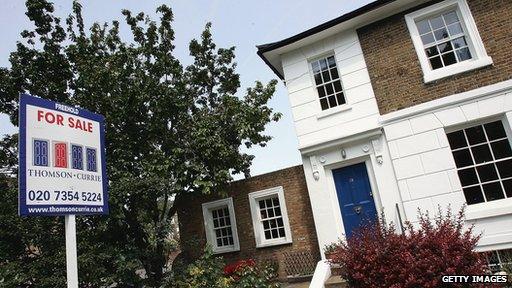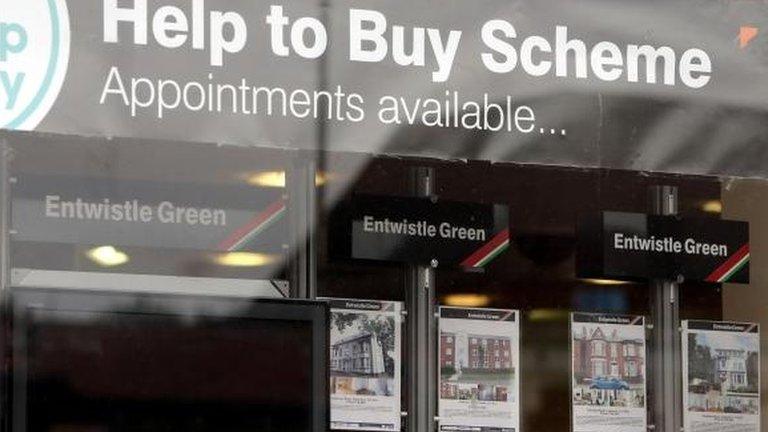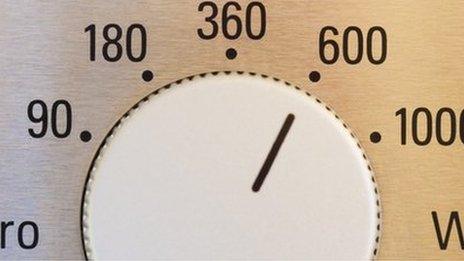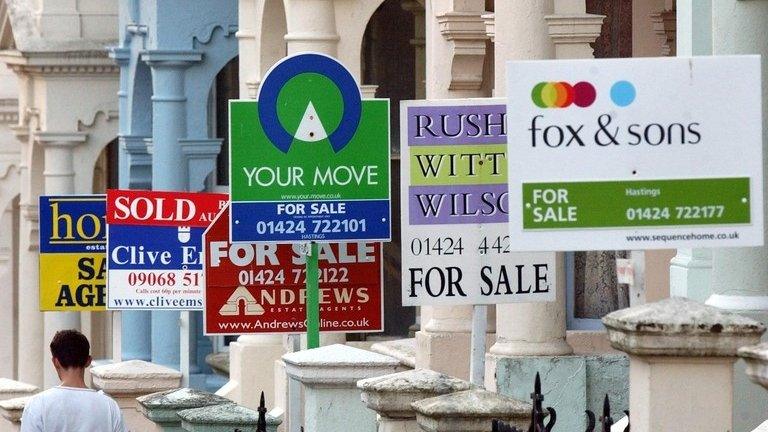Help to Buy: More than 7,000 homes sold under guarantee scheme
- Published

Some 7,313 homes have been sold so far under the Help to Buy mortgage guarantee scheme, the Treasury says.
The figures, external are the first comprehensive measure of the scheme since it was launched late last year.
The numbers from the Treasury also show that 80% of the properties sold went to first-time buyers.
The majority of sales were outside London, which will help the government to argue that Help to Buy has not had a major effect on house prices.
Just 5% of sales under the mortgage guarantee scheme were in the capital, where prices have soared, and 14% in the South East.
The mortgage guarantee scheme is separate from the equity loan part of Help to Buy, which began in England 13 months ago. Scotland and Wales have separate equity loan schemes.
Inflation
One senior economist said the figures showed that Help to Buy was not to blame for stoking up house price inflation.
The data provides "further evidence that government subsidies are playing little direct role in driving the current rapid rate of house price growth", said Martin Beck, senior adviser to the EY ITEM club.
But Liberal Democrat Business Secretary Vince Cable is among those who have argued that Help to Buy may be increasing house price inflation.
Prices across the UK are rising by 8% a year, according to the Office for National Statistics, and by 17% a year in London.
The mortgage guarantee figures officially cover the first three months of 2014, but include all applications since October 2013, when homebuyers were first able to register for the scheme.
Guarantees
At the same time, new figures on the first part of Help to Buy - the equity loan scheme- show that 20,548 new homes have been sold through the scheme in England in the 13 months since it began.
In total, 27,861 homes have now been sold under the two parts of Help to Buy.
That is a small proportion of the total number of homes sold over the same period.
Between October 2013 and the end of March 2014, roughly 500,000 homes were sold in the UK.
But only 7,313 homes were sold under the mortgage guarantee scheme during that time.
Ernst and Young calculated that amounted to just 1.2% of total house sales, and said the overall impact of the scheme was "distinctly underwhelming".
Under the equity loan scheme, buyers are able to buy a new-build home with a deposit of just 5%, and can borrow up to 20% of the property's value from the government. The government then owns a stake in the property.
Under the mortgage guarantee scheme, buyers can purchase any home up to the value of £600,000, and up to 15% of their loan is underwritten by the Treasury.
As with the equity loan scheme, buyers need to put down a deposit of at least 5%. The English scheme began in April 2013, but the Scottish and Welsh schemes started later.
Options
Fears that the Help to Buy scheme has driven a surge in house prices has led to speculation that the Bank of England could seek to modify it.
Earlier this month, Bank governor Mark Carney warned of the dangers the booming housing market posed to long-term financial stability, and said the Bank was considering providing advice on "changing the terms" of the Help to Buy scheme.
One option for the Bank's Financial Policy Committee (FPC) is to recommend a change in the rules, so that only properties under the value of £300,000, for example, would qualify for the scheme.
David Cameron: "We're getting people on to the housing ladder, achieving their dreams"
At the moment any property worth less than £600,000 is eligible.
Rob Wood, the chief UK economist with Berenberg Bank, believes the Bank should now try to cut the scheme back.
"We expect the Bank to recommend watering down the scheme in its annual review in September," he said.
However, others think it more likely that the FPC will recommend other measures to control the housing market - such as requiring lenders to hold more capital to protect themselves against risky loans - or limiting the amount they can lend in relation to a borrower's salary.
Lloyds has already announced that it will lend no more than four-times salary on mortgages above £500,000.
- Published29 May 2014
- Published30 December 2016

- Published9 July 2020

- Published20 May 2014

- Published28 May 2014

- Published20 May 2014
